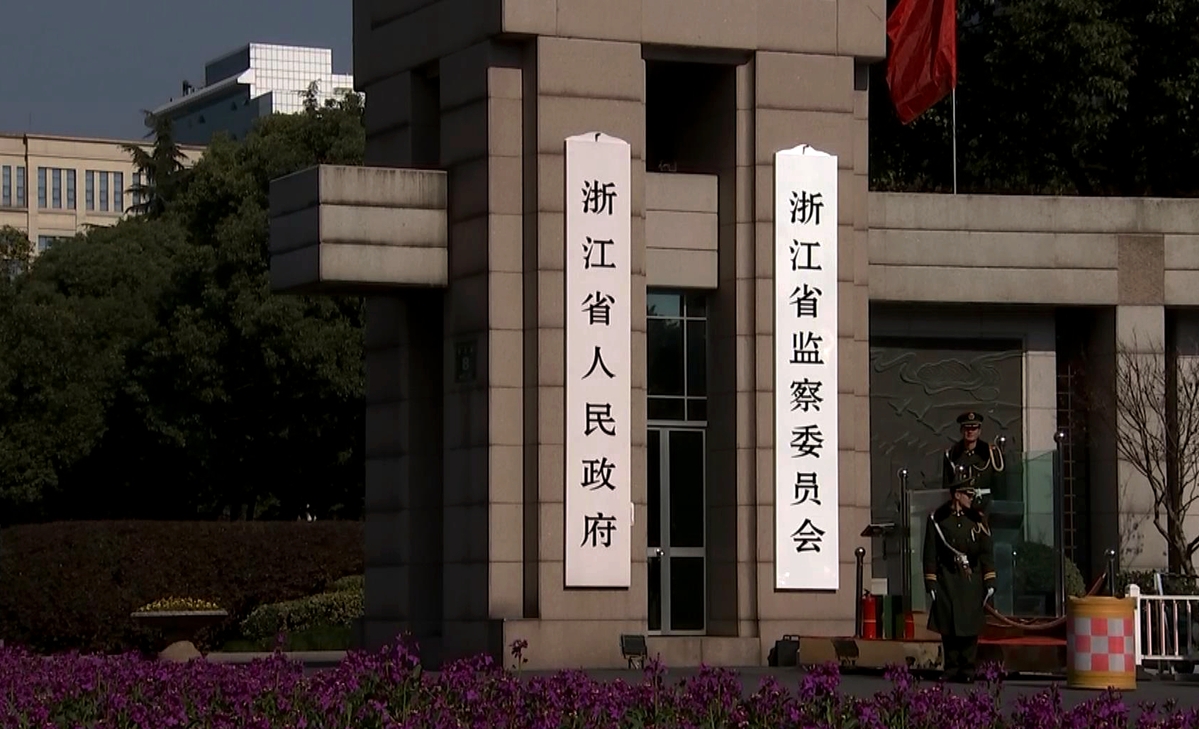The first corruption suspect detained by the Zhejiang Supervisory Commission, a civil servant, was imprisoned for 15 years and fined 2 million yuan ($318,000) by Hangzhou Intermediate People's Court in December.
China's supervisory commission pilot program had been launched in Zhejiang province, as well as in Beijing and Shanxi province, just over a year earlier.
When Jin Huanmin, a senior official at the Zhejiang Supervisory Commission, spotted the news on his smartphone, he glanced up at a pile of files on his desk.
A former deputy head of the Zhejiang People's Procuratorate's anti-corruption and bribery bureau, he had been told of his transfer to the commission as a supervision director 11 months earlier.
Alongside the files on his desk, several flowering potted plants that had also made the move from his former work unit had sprouted new leaves. At the same time, Jin's doubts about his new position had completely disappeared.
In the commission building, more than 50 supervision officers who, like Jin, also used to work for the prosecution authority, put in long hours as they perform their new duties.
In early November 2016, the Communist Party of China Central Committee issued a plan to set up supervisory commissions in the three pilot areas. At the Zhejiang People's Procuratorate in February last year, the sign for its anti-corruption and bribery bureau was removed.
"After working for 23 years as an anti-graft official in the prosecuting department, I didn't expect that the reform would be so fast," Jin said. "I was so reluctant to take off my prosecutor's uniform."
But his experience as a prosecutor made him realize it was time to integrate the country's scattered anti-corruption forces.
The duties of the various anti-corruption authorities, including those responsible for mounting prosecutions and those tasked with supervising the administration, had previously overlapped, he said, which made supervision more cumbersome.
"Only with reform will it completely change," Jin said.
After the anti-corruption and bribery bureau was disbanded, Jin was unsure of his next posting until late February last year, when Ma Guangming, deputy head of the Zhejiang Commission for Discipline Inspection, called him to his office.
"The Party has decided to transfer you and another 57 anti-graft colleagues in the prosecuting department to work in the Zhejiang Supervisory Commission," Ma told him. "You will serve as director of the No 12 supervision unit."
Jin, facing a new post and new requirements in a new environment, began working at the commission in early March last year.
A senior prosecutor for half of his life, Jin thought he could just move his working style and methods from the prosecuting department to the new post, but he quickly realized he was wrong.
There were 11 supervision officers in his new unit£six from his former department and five from the Party's anti-graft watchdog.
"When handling cases in the beginning, our working concepts, experiences and customs were all different and we didn't understand each other," Jin said.
Just a week into his new job, Jin's unit landed its first case, involving a provincial-level official suspected of graft.
"With no case to follow and no experience to draw from involving a provincial-level official, we just broke the ice and did it," Jin said.
He divided the inspectors into three teams, including one to interrogate the suspect and one to collect evidence. They investigated and analyzed more than 100 of the suspect's bank accounts and followed the flow of funds through about 20 companies to gather evidence.
Because of their close integration and their careful examination, they obtained the evidence they needed and ordered the detention of the suspect in April last year.
"Without detailed detention procedures or legal instruments for reference, we conquered difficulties to conduct the investigation and collect evidence," Jin said.
It took us only 20 days to confirm the facts of his crime and establish solid evidence, and in June the suspect was transferred to Zhejiang prosecutors to face charges. He is now awaiting trial on charges of accepting bribes.
This year, Jin's unit has received nine cases involving civil servants suspected of graft or violating Party rules. Three of the cases have been concluded, while work is continuing on the other six.
"Our ultimate goal is to prevent public servants being corrupted and build a clean government, not to punish them," Jin said.
Supervision Law backed
In March, the National People's Congress, the top legislature, approved the Supervision Law, designed to lay a legal foundation for an upgraded anti-graft task force.
Under the law, a new supervisory network has been established, consisting of supervisory commissions at the national, provincial, city and county levels, all with legally defined duties, liabilities and protocols.
"The new Supervision Law and anti-graft system has laid a solid foundation for the country to achieve an overwhelming victory in the fight against corruption," said Ma Huaide, vice-president of China University of Political Science and Law.
In the report he delivered to the Party's 19th National Congress in October, Xi Jinping, general secretary of the CPC Central Committee, said new supervision commissions would be established nationwide at various levels to provide for the full inspection of all civil servants.
The new commissions integrate existing supervisory, corruption prevention and control agencies within governments and procuratorates, as well as the Party's discipline inspectors.
"As a unified anti-graft agency under the Party's leadership, the supervisory commission system is an institutional invention incorporating China's reality and international practice," said Gao Bo, a political researcher at the Chinese Academy of Social Sciences.
"The extensive network will expand inspection to all public servants, leave no loopholes and serve as a powerful deterrent to corruption."
In late 2016, Beijing and Zhejiang and Shanxi provinces were chosen as supervisory commission pilot areas to better study how such a system would operate and then offer that experience to other regions.
By late February this year, directors of supervisory commissions had been appointed in 31 provinces, municipalities and autonomous regions.
In the three pilot areas, most of the anti-graft officers from disbanded procuratorate anti-corruption and bribery bureaus, as well as those tasked with stamping out dereliction of duty, were transferred to new posts in supervisory commissions at all levels. In China's other provinces and regions, the work is still in progress.
In Zhejiang, 1,645 officials from anti-corruption bureaus responsible to prosecuting departments have been sent to serve as supervisory commission inspectors since late 2016.
Liu Jianchao, head of the Zhejiang Commission for Discipline Inspection, said under the new commissions, the number of officials and civil servants under supervision had risen by December from 383,000 to 700,000. Between January and October last year, inspectors in Zhejiang received more than 500 tips related to graft, up by 77 percent from the same period in 2016.
In Beijing, more than 700 officials who worked for anti-corruption bureaus at the Beijing People's Procuratorate have transferred to a number of municipal supervisory commission departments, where they work with Party discipline inspectors, since the pilot program was launched in late 2016.
"They were sent to different positions based on their skills. We hope their experience in the judicial organs can complement the advantages of Party discipline inspectors," said Liu Yongqiang, a senior official with the Beijing Supervisory Commission.
Facing more challenges
Jin said compared with an anti-graft officer, "an inspector needs to be an all-rounder and faces more challenges".
"In the prosecuting department, I just dealt with individual corruption cases involving Party or government officials, but a supervision officer will also focus on cause and effect," he said.
Because they exercised supervision over all civil servants, if they discovered violations of Party rules or cases of graft, they would try to "collect and establish solid evidence, find the loopholes that allowed the corruption and prevent similar cases from occurring".
Jiang Laiyong, a senior researcher at the Chinese Academy of Social Sciences' China Anti-Corruption Research Center, said setting up the new supervisory commissions is considered "the ideal upper-level anti-graft design to cope with corruption crimes, and the supervisory system will be a powerful deterrent to corrupt officials".
Jiang said the different views and working methods of inspectors transferred from prosecuting departments needed to be integrated with those of Party discipline inspectors as soon as possible so they could talk effectively about the facts of cases, collect evidence and form a unified train of thought for handling corruption cases.
Moreover, the powerful supervisory commission inspectors need to be "more cautious and strictly follow the regulations when using inspection measures such as the detention and interrogation of suspects, border control and the freezing of illicit assets, before achieving the final victory in the fight against corruption", he said.









